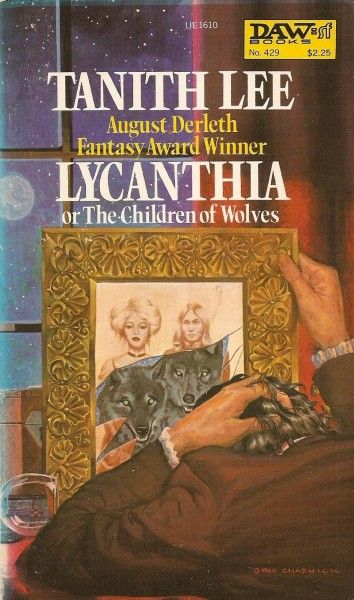Christian Dorse is a terrible person but a great protagonist
Lycanthia or The Children of Wolves
By Tanith Lee

15 Apr, 2016
0 comments
1981’s Lycanthia or The Children of Wolves is one of Tanith Lee’s standalone fantasies. It is not one that lends itself to sequels.
Christian Dorse returns to the family chateau. It had been lost to debt by his grandfather and has only now been returned to the Dorse family. The restored owner believes himself In the grip of a fatal malady, and does not expect to long enjoy possession of the estate.
Christian finds his new home suitably funereal as a setting for his decline and death. The rambling mansion has been decaying for years; the four servants have been unable to maintain more than a small part of the building. The chateau is both ruinous and isolated. The nearest thing to a town is a nearby village of backward and ignorant peasants.
Although he initially thinks of himself as an intruder, Christian soon embraces his role as the local lord. He enjoys what little luxury there is to be had and amuses himself with one of the servant women. That is, he amuses himself and she submits out of grudging loyalty to her seigneur.
Christian does have other neighbours. The de Lagenay siblings, Luc and Gabrielle, dwell in a hut in a wood not far from the chateau. They are feared and shunned by the villagers — for good reason. The woods in which they live are also home to wolves. The peasants believe the wolves and the de Lagenays to be one and the same. There’s talk of an ancient curse.…
A curse for which Christian’s own ancestors were responsible. A curse to which Christian is still inextricably connected.
~oOo~
Generally, when a pallid young intellectual ventures into some feudal backwater, the odds are that he will be savaged by the fell creatures whose nature his book-learning inclines him to deny. That is what I expected. That, indeed, is what Lee allows readers to expect. I got played.
Lee could have taken another tack: poor languid Christian could have discovered his family’s Dark Secret and been destroyed by the revelation (like one of Lovecraft’s more useless protagonists). But that’s not where she is taking us. The Dorses have their secrets, but Christian learns to embrace them.
OR, she could have taken a page from books like Mowatt’s A Whale for the Killing, and focused on the horrible consequences of fear and prejudice. There’s a fair bit of that. The local villagers are vicious cowards, brave only in mobs; they do terrible things when they have the upper hand. But even that is not where Lee is going.
This book is focused on Christian’s discovery of what a truly awful person he is. In astonishingly short order, he goes from supposedly civilized man to lord demanding his droit du seigneur. He has no real moral compass and falls into his role as evil lord without any resistance. His terminal illness may be entirely imaginary, but there is something terribly wrong with him: a crucial absence that Christian is eventually forced to acknowledge after his final, worst betrayal. Lee’s portrait of Christian is without pity and yet enthralling.
Lycanthia is available only to Britons. Otherwise, used bookstores are your friend.
